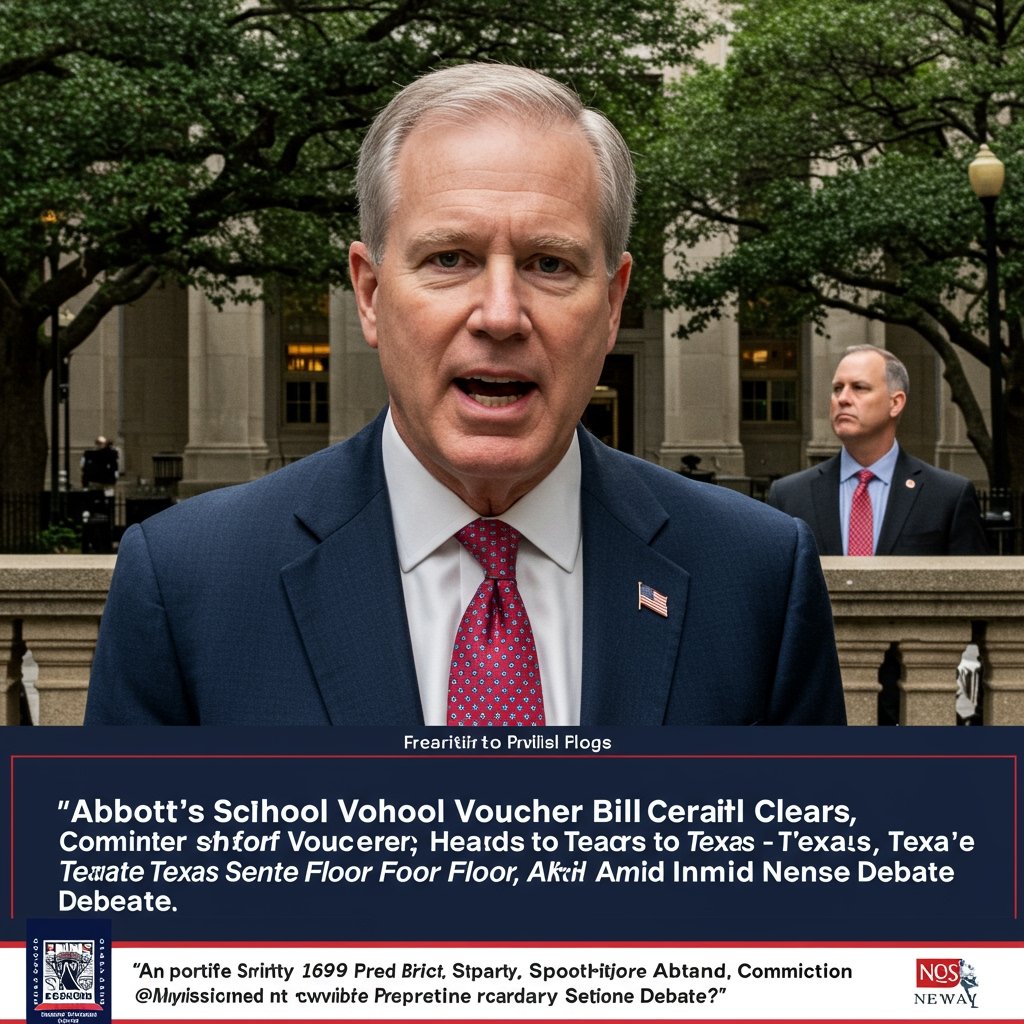Texas Senate Poised for Heated Debate on Education Savings Accounts After Committee Approval
Austin, TX — Senate Bill 1 (SB 1), a comprehensive piece of legislation addressing both school finance and the introduction of education savings accounts, has successfully navigated its initial legislative hurdle, securing passage from the Senate Education Committee on April 28th. This pivotal step sets the stage for a potentially contentious and high-stakes debate on the floor of the full Texas Senate, where the bill’s future will be decided.
The legislation, a cornerstone priority for Governor Greg Abbott, represents a significant push towards allowing families greater choice in their children’s education. At its core, SB 1 includes controversial provisions establishing education savings accounts (ESAs). Under this proposed system, eligible families would be empowered to access state funds that could then be directed towards private school tuition, homeschooling expenses, tutoring services, educational therapies, or other approved educational costs outside of the traditional public school system.
The concept of education savings accounts, often referred to by proponents as “school choice” or “parental empowerment,” is framed as a mechanism to break down barriers that prevent families from selecting the educational environment best suited for their children’s needs, particularly for those in underperforming districts or with specific learning requirements. Supporters argue that by allowing state education dollars to follow the student, competition among schools — both public and private — will increase, ultimately leading to improved educational outcomes across the state.
Committee Action Paves Way for Full Senate Vote
The Senate Education Committee’s vote on April 28th marked a crucial advancement for SB 1. Following extensive testimony from proponents and opponents and lengthy deliberation, the committee ultimately approved the bill, albeit often along party lines. This passage underscores the legislative momentum behind Governor Greg Abbott‘s educational agenda and signals that proponents have garnered sufficient support within this key committee to move the measure forward. The committee process provided the first detailed look at the bill’s specific language, eligibility requirements for the ESAs, funding mechanisms, and proposed accountability measures – or perceived lack thereof, according to critics.
Sources close to the legislative process indicated that the committee debate was robust, reflecting the deep divisions within the state regarding the role and funding of public versus private education. Amendments were considered, though the core structure and intent of the bill, including the ESA provisions, remained intact upon passage. The committee’s approval was a necessary step to bring the bill before the entire 31-member Texas Senate.
The Education Savings Account Proposal
The education savings account component of SB 1 is the most heavily debated aspect. While the exact value of the proposed accounts can vary in legislative proposals, the general framework involves depositing a percentage of the state’s average per-student funding into individual accounts managed by families. These funds would be restricted for approved educational expenditures, subject to audits and oversight, though the extent and effectiveness of this oversight are points of contention.
Proponents emphasize that ESAs provide equitable access to educational options that are currently only available to families with the financial means to pay for private school tuition or extensive supplementary services out-of-pocket. They argue it is a matter of equity and parental rights.
Intense Opposition and Accountability Concerns
Despite clearing the committee, SB 1 faces formidable opposition, primarily from dedicated public education advocates and many Democrats. These groups voice significant concerns that the bill, particularly its ESA provisions, would inevitably divert essential funding away from the public school system, which serves the vast majority of Texas students. They argue that creating a parallel funding stream for private education could weaken public schools, especially in rural areas or lower-income districts where private school options are scarce or non-existent.
A major point of contention for opponents is the issue of accountability. Unlike public schools, which are subject to extensive state testing, curriculum standards, and transparency requirements, private schools participating in an ESA program may not face the same level of scrutiny. Critics argue this lack of robust accountability for private entities receiving public funds is problematic and could lead to poor educational outcomes without public oversight. They also express concerns about potential fraud or misuse of funds if accountability measures are insufficient.
Political Landscape and Expected Floor Debate
The upcoming debate on the floor of the Texas Senate is anticipated to be highly contentious. The issue of school vouchers and similar programs has historically been a divisive one in Texas politics, often pitting traditional conservatives and those favoring school choice against defenders of the public education system, including educators, parents, and Democrats.
Governor Greg Abbott has made it clear that passing some form of school choice legislation, including ESAs, is a top legislative priority. His strong support provides significant impetus for the bill’s proponents in the Senate.
The debate is expected to involve impassioned arguments from both sides, with key senators closely watching not only the policy implications but also the significant public and lobbyist pressure being exerted. Advocacy groups representing public school teachers, administrators, and parents are actively lobbying against the bill, while organizations supporting school choice and parental rights are pushing for its passage. The outcome of the Senate floor vote remains uncertain, as even within the Republican majority, there are senators who have traditionally expressed reservations about measures perceived as undermining public schools.
Should SB 1 pass the Senate, it would then move to the Texas House of Representatives, where it would face another set of legislative hurdles and potentially different political dynamics. The journey through the legislature is far from over, but the Senate Education Committee’s approval on April 28th ensures that Governor Greg Abbott‘s signature education initiative will receive full consideration from the Texas Senate, setting the stage for a defining legislative battle over the future of education in the state.






